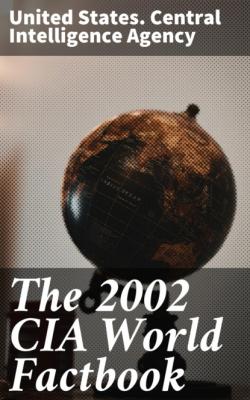ТОП просматриваемых книг сайта:
The 2002 CIA World Factbook. United States. Central Intelligence Agency
Читать онлайн.Название The 2002 CIA World Factbook
Год выпуска 0
isbn 4064066092382
Автор произведения United States. Central Intelligence Agency
Жанр Социология
Издательство Bookwire
GDP: purchasing power parity - $24.3 billion (2001 est.)
GDP - real growth rate: 9.9% (2001 est.)
GDP - per capita: purchasing power parity - $3,100 (2001 est.)
GDP - composition by sector: agriculture: 22% industry: 33% services: 45% (2000 est.)
Population below poverty line: 64% (2001 est.)
Household income or consumption by percentage share: lowest 10%: 2.8% highest 10%: 27.8% (1995)
Distribution of family income - Gini index: 36 (1995)
Inflation rate (consumer prices): 1.6% (2001 est.)
Labor force: 2.9 million (1997)
Labor force - by occupation: agriculture and forestry 32%, industry 15%, services 53% (1997)
Unemployment rate: 20% (official rate is 1.3% for 2001) (1999 est.)
Budget: revenues: $888 million expenditures: $978 million, including capital expenditures of $NA (2001 est.)
Industries: petroleum and natural gas, petroleum products, oilfield equipment; steel, iron ore, cement; chemicals and petrochemicals; textiles
Industrial production growth rate: 5.1% (2001 est.)
Electricity - production: 17.6 billion kWh (2000)
Electricity - production by source: fossil fuel: 91.37% hydro: 8.63% other: 0% (2000) nuclear: 0%
Electricity - consumption: 16.7 billion kWh (2000)
Electricity - exports: 900 million kWh (2000)
Electricity - imports: 1.25 billion kWh (2000)
Agriculture - products: cotton, grain, rice, grapes, fruit, vegetables, tea, tobacco; cattle, pigs, sheep, goats
Exports: $2 billion (f.o.b., 2001 est.)
Exports - commodities: oil and gas 90%, machinery, cotton, foodstuffs
Exports - partners: Italy 43.7%, France 11.8%, Israel 7.7%, Turkey 6.0%,
France 5.6% (2000)
Imports: $1.6 billion (f.o.b., 2001)
Imports - commodities: machinery and equipment, foodstuffs, metals, chemicals
Imports - partners: Russia 21.3%, Turkey 11%, US 8.9%, Iran 5.8%,
Germany 5.8% (2000)
Debt - external: $1.5 billion (2001)
Economic aid - recipient: ODA, $113 million (1996)
Currency: Azerbaijani manat (AZM)
Currency code: AZM
Exchange rates: Azerbaijani manats per US dollar - 4,804 (11 February 2002), 4,656.58 (2001), 4,474.15 (2000), 4,120.17 (1999), 3,869 (1998), 3,985.38 (1997)
Fiscal year: calendar year
Communications Azerbaijan
Telephones - main lines in use: 663,000 (1997)
Telephones - mobile cellular: 40,000 (1997)
Telephone system: general assessment: inadequate; requires considerable expansion and modernization; teledensity of 8.6 main lines per 100 persons is very low domestic: the majority of telephones are in Baku and other industrial centers - about 700 villages still without public telephone service; satellite service connects Baku to a modern switch in its exclave of Naxcivan international: the old Soviet system of cable and microwave is still serviceable; a satellite connection to Turkey enables Baku to reach about 200 additional countries, some of which are directly connected to Baku by satellite providers other than Turkey (1997)
Radio broadcast stations: AM 10, FM 17, shortwave 1 (1998)
Radios: 175,000 (1997)
Television broadcast stations: 2 (1997)
Televisions: 170,000 (1997)
Internet country code: .az
Internet Service Providers (ISPs): 2 (2000)
Internet users: 12,000 (2001)
Transportation Azerbaijan
Railways: total: 2,125 km in common carrier service; does not include industrial lines broad gauge: 2,125 km 1.520-m gauge (1,278 km electrified) (1993 est.)
Highways: total: 36,700 km paved: 31,800 km (includes some all-weather gravel-surfaced roads) unpaved: 4,900 km (these roads are made of unstabilized earth and are difficult to negotiate in wet weather) (1990)
Waterways: none
Pipelines: crude oil 1,130 km; petroleum products 630 km; natural gas 1,240 km
Ports and harbors: Baku (Baki)
Merchant marine: total: 54 ships (1,000 GRT or over) totaling 246,051 GRT/306,756 DWT ships by type: cargo 12, petroleum tanker 40, roll on/roll off 2 (2002 est.)
Airports: 52 (2001)
Airports - with paved runways: total: 9 2,438 to 3,047 m: 5 1,524 to 2,437 m: 4 (2001)
Airports - with unpaved runways: total: 43 1,524 to 2,437 m: 7 914 to 1,523 m: 8 under 914 m: 28 (2001)
Military Azerbaijan
Military branches: Army, Navy, Air and Air Defense Forces
Military manpower - military age: 18 years of age (2002 est.)
Military manpower - availability: males age 15-49: 2,131,331 (2002 est.)
Military manpower - fit for military service: males age 15-49: 1,706,325 (2002 est.)
Military manpower - reaching military age annually: males: 77,099 (2002 est.)
Military expenditures - dollar figure: $121 million (FY99)
Military expenditures - percent of GDP: 2.6% (FY99)
Transnational Issues Azerbaijan
Disputes - international: Armenia supports ethnic Armenian secessionists in Nagorno-Karabakh and militarily occupies almost one-fifth of Azerbaijan - Organization for Security and Cooperation in Europe (OSCE) continues to mediate dispute; Azerbaijan signed bilateral agreements with Russia delimiting the Caspian seabed, but littoral states are far from multilateral agreement on dividing the waters and seabed regimes - Iran insists on division of Caspian Sea into five equal sectors while Azerbaijan, Kazakhstan, Russia, and Turkmenistan have generally agreed upon equidistant seabed boundaries; Iran threatens to conduct oil exploration in Azerbaijani-claimed waters, while interdicting Azerbaijani activities; Azerbaijan and Turkmenistan await ICJ decision to resolve sovereignty dispute over oilfields in the Caspian Sea
Illicit drugs: limited illicit cultivation of cannabis and opium poppy, mostly for CIS consumption; limited government eradication program; transshipment point for opiates via Iran, Central Asia, and Russia to Western Europe
This page was last updated on 1 January 2002
========================================================================
Albania
Introduction
Albania
Background: In 1990 Albania ended 44 years of xenophobic communist rule and established a multiparty democracy. The transition has proven difficult as corrupt governments have tried to deal with high unemployment, a dilapidated infrastructure, widespread gangsterism, and disruptive political opponents. International observers judged local elections in 2001 to be acceptable

